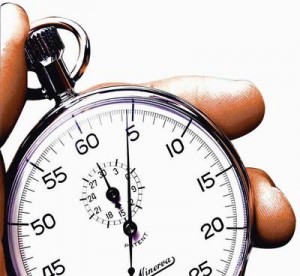 As a consultant and keynote speaker, I get to work with a wide variety of organizations. As you might imagine, I see a lot of different problems and challenges from one company to another, but I also see a lot of similarities. One of the core issues I find almost everyone struggling with these days is time management.
As a consultant and keynote speaker, I get to work with a wide variety of organizations. As you might imagine, I see a lot of different problems and challenges from one company to another, but I also see a lot of similarities. One of the core issues I find almost everyone struggling with these days is time management.
Most of us have more on our plates than any two or three people would want to handle. And every day we get inundated with much more information than we need or can possibly use. Throw in all the distractions from voice mail, email, texting, tweeting, etc., and it’s a wonder we can focus on a single task for more than a few minutes at a time.
I believe the problem is not so much a lack of time as a lack of focus. Accordingly, I have found one of the simplest ways to manage time more effectively is to get and stay focused on winning — in big ways and in little ways.
By “big ways,” I mean engaging in strategic-level activities that get the whole organization focused on winning. This includes defining the company’s mission, vision, guiding principles, value propositions, core strategies, and destination points with sparkling clarity. Then make sure employees at all levels understand and buy into these key areas of focus.
Winning starts with knowing exactly where you’re going, what it will look like when you get there, and how you will act with each other in the process of reaching your destination. When people understand where the organization is headed and are aligned with what it takes to get there, you spend a lot less time putting out fires and redirecting people to the appropriate tasks and activities. This frees you up to devote more time to the core activities that support your company’s vision of winning.
So paint a compelling picture of what winning looks like for your business. Communicate it regularly so that people never lose sight of that picture. And then set up the systems, processes, and ways of working that support reaching your destination.
By “little ways,” I mean developing personal habits that keep you and others focused on winning. For example, start your day by taking five minutes to think about winning. Pause for a moment, look at your daily calendar, and ask:
- What are the most important activities I need to engage in today?
- How do these support our vision of winning?
- Of everything I do today, what will really matter a year from now?
- What tasks or activities can I delegate that will allow me to focus on the areas that most support our winning?
Similarly, take five minutes at the start of each team meeting to focus on winning. Ask:
- What do we need to accomplish in this meeting to support our vision of winning?
- How will we work together to accomplish that?
- What information or data will we share?
- What decisions will we reach?
- How will we ensure that all viewpoints and perspectives get heard?
To support these habits, populate your work environment with small visual reminders that keep you focused on winning. The power of suggestion is real, so make sure your clear goals or objectives are visible to you (and others) throughout the day. Put them on your computer screen and smart devices, carry them in your notebook, or set up task reminders to ping you. Write them on whiteboards, post them in the lobby of your office, and on a mirror at home. Do whatever works for you to stage your field of vision and set yourself up to win.
Time management isn’t about finding an extra hour or two in the day; it’s about using the time we have more judiciously. The biggest problem with distractions like emails and phone texts is that they all seem urgent, even when they’re not. So we interrupt what we’re doing to pay attention to them, and in doing so we take our focus off what we need to be doing to win.
Starting each day by focusing on winning reminds us of where and how we should be spending our time. It also makes it easier to resist the urge to respond to distractions that might seem important but really aren’t. When we manage our distractions instead of letting them manage us, we have a lot more time to accomplish the things we need to do in order to win.
Call to action: Take five minutes each morning to focus on winning.








